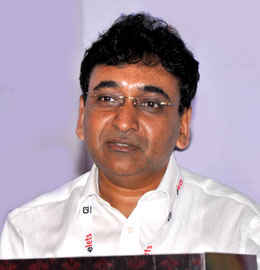When we talk about payments, we have to talk about a lot of currency floating around and lesser digital and mobile channels of money, says Rajesh Aggarwal , Joint Secretary, Department of Finance Services, Government of India in conversation with Kartik Sharma, Sneha Mejari and Akanki Sharma of Elets News Network (ENN)

Joint Secretary, Department of Finance Services,
Government of India
Can you throw some light on the concept of financial untouchability?
Generally, the Pradhan Mantri Jan-Dhan Yojna (PMJDY) is considered as a financial inclusion programme only. But if we delve deeper, it is actually much beyond that.
Few decades ago, despite nationalisation of banks, social untouchability was there in the economic and financial system. There were people who belonged to the lower strata of the society, with the majority coming from the SC/ST category. Nobody would touch this segment and banks would deny opening their bank accounts and the financial institutions would not give them easy credits. So, when I talk of national inclusion, I also talk about shutting the door of any type of financial untouchability.
What are the ways to get this ignored population into the financial ambit?
We basically had all the rules, policies, procedures from banking regulator RBI and other banks and financial players. For instance, theoretically we had the master circulars to allow people to open bank accounts. In 2012, RBI has said that Aadhaar can also be used as an identity proof, but even that was failed to have much impact.
Coming to the incumbent government, even it did not change the rules and policies. But, there was an apparent change in the attitude. Survey after survey has shown that the core of the country is still away from the financial system. Gradually we can see the bankers getting sensitised to the issue. I have heard from many bankers that after remaining in CMD’s chair for years together, they are now feeling satisfied that they have been able to do something good for the society. So, this attitudinal change is taking place at all levels.

With the advent of new payment banks, how do you see the payment systems taking shape in the country?
Talking about traditional ways of transaction, one should also talk about a lot of currency floating around, instead of digital and mobile channels of money like easy cash-in, cash-out facilities closer to the villages, easy channels of remittance, etc.
The entire gamut of Jan-Dhan accounts, more ATMs, micro-ATMs, etc., is providing avenues to save their earnings via digital mode. As an IT Secretary, you have the experience of using IT for innovative purposes. How do you see use of IT taking India to the path of cashless economy?
IT is basically the heart and soul of every insurance company and bank. A lot of operations are going mobile these days. For instance, Paytm itself has 10 crore customers and different surveys are showing that practically every household in the country has access to some kind of bank account or a postal account or a mobile wallet. Then, we have the Aadhaar, where 900 million people have been issued Aadhaar numbers and it provides an instant online verifiable method of identity. And it could be through biometric or mobile-based OTP. The third is mobile, more than 900 million sim cards are active. So, combining these three can really lead to total change in the way service is delivered.
Insurance inclusion is also missing in this country. It is said that less than two percent people in this country have some kind of insurance, 98 per cent simply have no insurance. So, when we came up with ` 12 Suraksha Beema Scheme, it was incredibly simple. You have to have a bank account, your age has to be between 18 and 70 and you have to have an amount of minimum 12Rs in the bank account. Further, there is no subsidy from the government at all and it even has private insurance companies involved in the project. Also, we requested IRDA, the regulator and they agreed that electronic evidence will also be admissible.
There was a view when PMJDY was incorporated that these accounts will be opened, then there will be no transactions and there will be no use of those accounts. But things are going on. Do you think that notion was wrong and things are falling at place?
Initially, some bankers were sceptical because one can specially have a special drive and open account just for the heck of it. Fortunately, it did not happen and the zero balance account was also a master – stroke. Initially, some felt that it was not good. There were people who felt humiliated going with 50Rs or 100Rs to the banks and when Prime minister himself said that he has proudly opened zero-balance account, that humiliation factor was gone.
Moreover, it came with totally online accounts, and people got ATM cards with pin number. As the online account was open, people could see it with mobile and Aadhaar numbers. So, they can do mobile banking also. They can use micro ATM, and now we see that more than 26,000Rs have come to these accounts.
Also, the chairmen of many banks are saying that it’s a comfortable venture for us. We are not making losses in Jan-Dhan accounts. Banks are earning about 1,000 crore per annum from these accounts by way of interest and so on. So, there is definitely money at the bottom, as it’s a commercially viable programme.
Insurance inclusion is also missing in the country. Less than two per cent people in this country have some kind of insurance and 98 per cent simply have no insurance. So, when we came up with 12Rs Suraksha Beema Scheme, it was instant success
You also handle National Insurance Company (NIC). Do you see making it as a model insurance company or corporation?
National insurance is one of the oldest insurance companies in the country, established in 1906. Commercially also, it is doing quite well. On the social front also, the Suraksha Beema has done the highest numbers, almost 50 per cent of the Surak – sha Beema have come from national insurance. And in insurance inclusion, we ar e trying to make sure that we go to more and more villages through online channels and mobile channels to reach out to more rural areas. We can even sponsor SC/ST boys and girls from villages and their certification fees we can pay from national insurance so that they can also come up and start selling insurance products.
What is your message for the participants conference on Financial Inclusion Payment Systems?
I have always enjoyed conferences organised by Elets group on various topics. I am sure this conference will also see good audience with multiple interests. This is the field where lot of innovations are coming up, new start-ups are coming up, lot of new ideas and technologies are floating around. So, conferences like these really help policy makers, technology guys, bankers and insurance people.
Elets The Banking and Finance Post Magazine has carved out a niche for itself in the crowded market with exclusive & unique content. Get in-depth insights on trend-setting innovations & transformation in the BFSI sector. Best offers for Print + Digital issues! Subscribe here➔ www.eletsonline.com/subscription/




















